Deep Focus: Learning to Drive
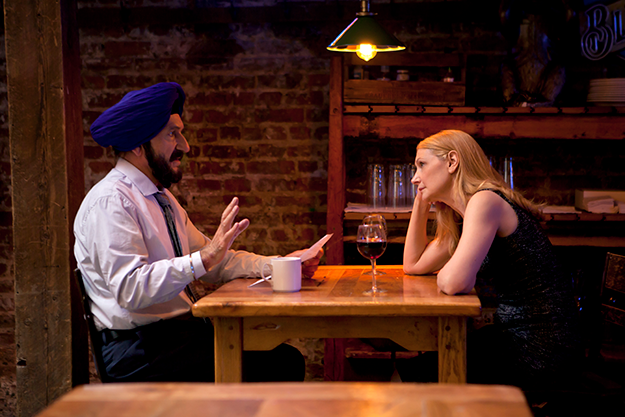
What’s astonishing about Isabel Coixet’s Learning to Drive, a fictional rendering of Katha Pollitt’s personal essay of the same name, is the way the film turns Pollitt’s wry, feminist take on the breakup of a seven-year relationship into a victim fable. The Pollitt character, Wendy Shields (Patricia Clarkson), remains a woman of letters. She’s a New York–based literary critic rather than a leftist columnist and poet like Pollitt. Unfortunately, she composes just one withering review of her former mate, Ted (Jake Weber): she says that Ted’s next woman should get ready to support him because he hasn’t been able to win tenure in 20 years.
Instead of leveling zingers at Ted, Wendy abases herself before him. Even in their introductory scene, as she berates him for picking a public place (a restaurant) to announce that he is leaving her, she also begs him not to go. She pounds him the way Julia Louis-Dreyfus whales on the guys in Seinfeld, but every shove or smack registers as a love tap in disguise. The movie approaches its nadir of masochism when Wendy tries to seduce Ted when he’s picking up his stuff at their townhouse. It plummets into the pits when Wendy confesses to her driving instructor and masculine ideal, Darwan Singh Tur (Ben Kingsley), that her only talent is shutting out everything except words, including the people she loves.
Sarah Kernochan’s script contains many of the essay’s best lines, but it fails to imbue Wendy with Pollitt’s hard-won self-knowledge. Pollitt writes: “I noticed that our apartment was becoming a grunge palace, with books and papers collecting dust on every surface and kitty litter crunching underfoot. I observed—very good, Kahta!—that I was spending many hours in my study, engaged in arcane email debates with strangers, that I had gained twenty-five pounds in our seven years together and could not fit into many of my clothes. I realized that it was not likely that the unfamiliar pink-and-black-striped bikini panties were the result, as he claimed, of a simple laundry-room mix-up. But all this awareness was like the impending danger in one of those slow-motion dreams of paralysis, information that could not be processed. It was like seeing the man with the suitcase step off the curb and driving forward anyway.” As her driving instructor is quick to tell her, “Observation, Kahta, observation! This is your weakness.” He will finally teach her observation, and perception.
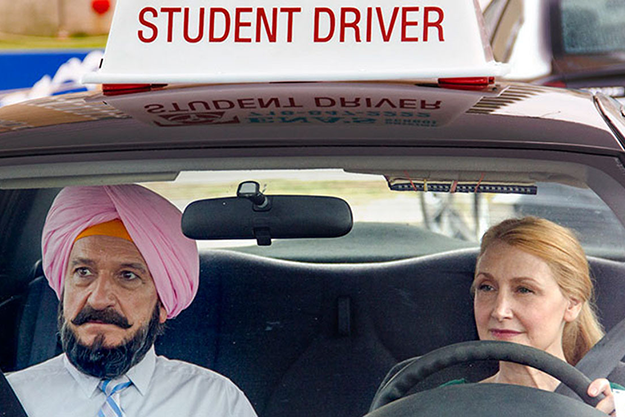
The writer and director choose to focus on the driving teacher and render the heroine’s unfaithful man in shorthand, as a handsome urban example of a virile, middle-aged academic. (He hopes to become a suburban squire with his new woman by his side.) Kernochan and Coixet don’t do anything pointed or satirical with the amiable, slippery Ted. Even the spurned wife’s recollections of their tender moments are soft, banal, and forgettable—her dancing on Ted’s feet, or Ted standing bottomless with his back to her in front of the bathroom sink. I’m no fan of Nora Ephron’s screenwriting, but the adoring shot of Weber’s backside reminded me of Tom Hanks and Rob Reiner’s befuddlement in Sleepless in Seattle over women’s obsession with “cute butts.” (“Even on the news women talk about cute butts.”)
The source material is infinitely richer. Why would an American independent movie steer away from an ultra-left antagonist in an era when a socialist can upend the Democratic primary season? Kernochan turns Pollitt’s pompous, womanizing seven-year Marxist boyfriend into a bland, philandering 21-year husband. Kernochan says in the press kit that Pollitt’s essay, though a gem, lacks “basic drama,” because she gets along with her driving teacher. Well, what about the failed romance in the story?
The divide between a doctrinaire Marxist and an independent progressive sounds like plenty of drama to me. If the filmmakers felt they had to add more, they could have bought the rights to Pollitt’s other love-related essays: “Webstalker,” in which she tracks her former lover and his current girlfriend on the Internet; “In the Study Group,” in which she concludes that his Marxist study group was a cult; and “Sisterhood,” in which she contacts women he was sleeping with when she thought he made love only to her. Together, the essays comprise an unsentimental education in gender roles and coupling.
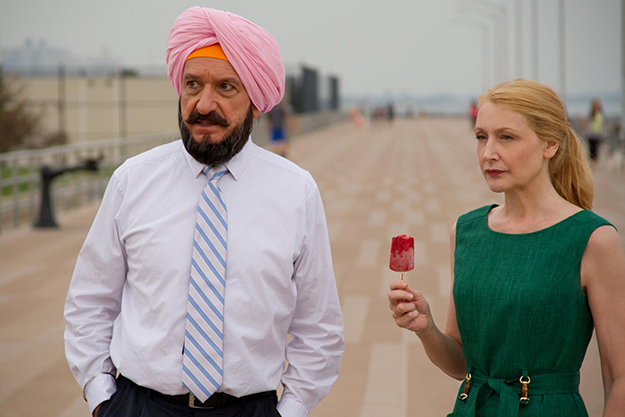
In “Sisterhood,” Pollitt writes: “Now I saw slapped down on the table what women really shared: the longing for male approval, the bartering of self-respect for relationship, the endless making of excuses, the obstinate refusal to know what you know.” The obstinate refusal to know what you know—what better subject is there for a comedy-drama about a deceiving man and a self-deceiving woman?
Instead of taking off from the heroine’s mixture of high intelligence and delusion—and, later, her ability to see through herself—Kernochan chooses to heighten the drama in broad strokes by changing the nationality of the educator. Pollitt’s Ben is a highly assimilated Filipino American. His movie counterpart is a Sikh political refugee from India. I can’t help questioning the choice. Pollitt’s Filipino teacher is a droll, pungent figure. He patiently waits for the day when he can move his schoolteacher fiancée from their native land to America. Or maybe not so patiently waits, since he has progressed from drinking two beers after work to three. It may be a challenge to extract comedy and drama from a placid existence, but is it impossible?
Wendy’s driving instructor Darwan is very similar to Pollit’s Ben. As Pollitt puts it: “In a way, he’s perfect—his use of the double brake is protective without being infantilizing, his corrections are firm but never condescending or judgmental, he spares my feelings but tells me the truth if asked.” He even borrows Ben’s gift for evocative metaphor. He compares judging how far a car goes in each direction during parallel parking with testing the seasoning while cooking a beef stew. “You taste the direction” during parking the way you would the salt and pepper for the stew.
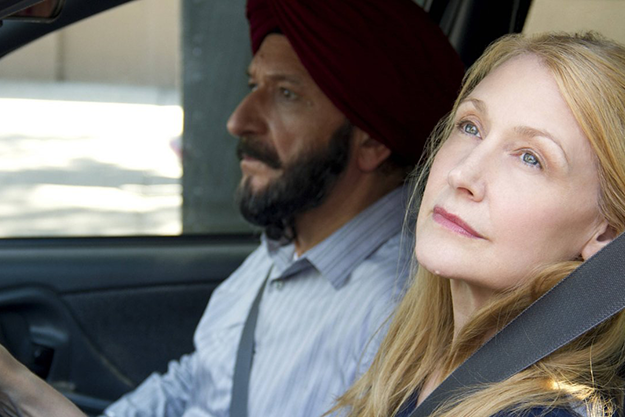
Darwan is a naturalized citizen, but he lives in a communal apartment with illegal workers, including his nephew Preet (Avi Nash). The details of their daily life are fascinating, from the winding and fitting of their turbans to Darwan’s cooking their meals. A government raid on their rooms brings home the cramped fragility of their lives, especially when Preet crawls out from a cabinet underneath the kitchen sink. But Darwan and Wendy’s getting-to-know-you arc is too cozy and familiar, no matter how intelligently Coixet handles their cultural rifts. It would have been vastly fresher and more challenging to depict the sexual deceptions of a radical idealist.
Patricia Clarkson, a lissome 5 foot 4, is a mighty mite of an actress. She summons every bit of pathos and drama from Wendy’s vertiginous mood swings. But within the confines of the script, she can’t interject any saving grace or irony. Even her daughter Tasha (the ubiquitous Grace Gummer) knows more than she does about her breakup. Wendy assures her that Ted is merely going through his third edition of the seven-year itch, and that he’s certain to come back to her. Tasha replies that her dad told her he’s filing separation papers.
While Darwan teaches Wendy how to merge into traffic, his sister back in India gathers candidates for his arranged marriage. Darwan defends the process to Wendy, saying that Western romantic love is, by contrast, awash in ego. When his bride, Jasleen, arrives at the airport, in the handsome form of Sarita Choudhury (best known here as Saul’s wife in Homeland), he’s at a loss to make her happy. His frustrations well up into romantic feelings for Wendy. But Wendy shuns his clumsy advances. She wants to retain him as a masculine ideal: wise, stalwart, and faithful.
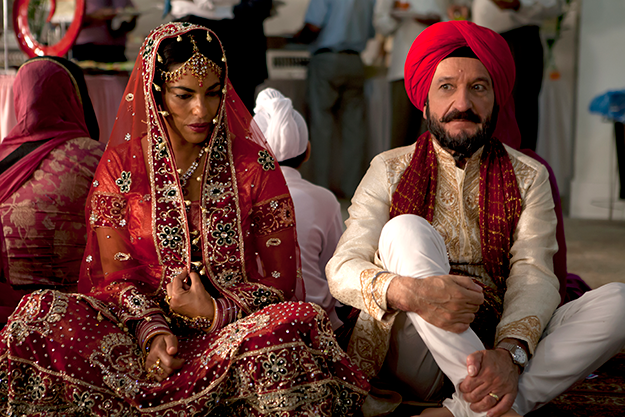
Kingsley’s casting as Darwan is promising. There’s an erotic tinge to his formality, and it’s inherently amusing to hear him issue driving instructions as simple as “Gradually… gradually…” in his Gandhian tones. Darwan treats it as a predictable part of his day when all-American thugs taunt him as “Osama.” (In a funny touch, Wendy is the one who needs to control road rage.)
But the film’s determination to parallel Darwan’s married life and Wendy’s post-married life foils Kingsley’s struggle to enliven his ultra-dignified character. Too many elements are exotically dressed-up clichés. Wouldn’t a man as observant as Darwan realize that his new bride is illiterate when she can’t read her name on the sign he holds up for her at the airport? Wendy mentions that her husband used to select a book of poems, read one, then pick another for her to read to him, as his head rested in her lap. When Darwan awkwardly duplicates this ritual with Jasleen (that’s how he learns that she can’t read), it’s too far-fetched to be poignant. It’s ridiculous.
Wendy’s post-marital escapades include sleeping with an eligible bachelor (Matt Salinger) who exhausts her with tantric sex. Samantha Bee plays Wendy’s sister Debbie, who sets them up. She gets the film’s raciest line—“All men want is to be woken up with a blow job” (Pollitt’s boyfriend coined this saying)—but she has nothing to play except the conventional, wised-up sibling of the clueless literatus. John Hodgman also shows up, as a car salesman who presumes that Darwan and Wendy are a couple. Neither veteran of The Daily Show conjures any smart, knowing humor.
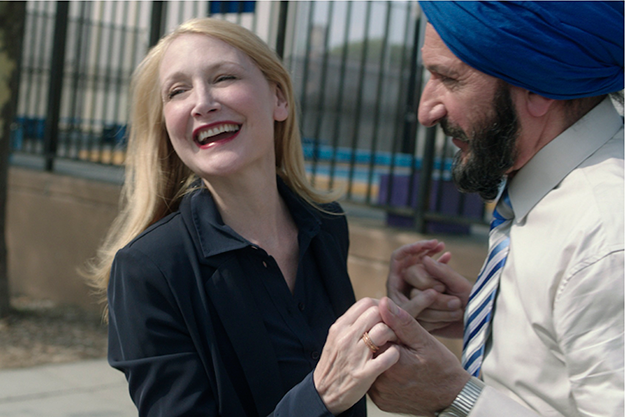
It used to be a reviewer’s cliché to say “the book was better.” In our supposedly more sophisticated age, it’s now considered de rigueur to “take a film on its own terms.” But the only upside to Coixet’s movie is that it captures just enough of Pollitt’s crisp material to make you want to read not just the title essay but all the mini-memoirs collected in Learning to Drive and Other Life Stories. The downside is that the movie pales in comparison.
Coixet’s direction can be witty, especially when she films the driving scenes from Wendy’s fearful, wavering perspective, with obstacles or threats lurking from every corner of the windshield. But Coixet’s attempt to make a feel-good movie from a trenchant essay mostly leaves you feeling meh.







